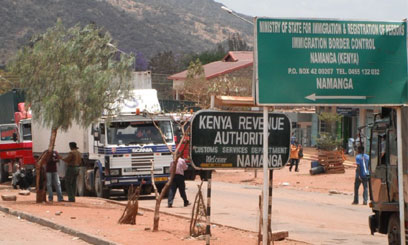The Kenya Association of Manufacturers (KAM) has issued a stark warning that ongoing political unrest in neighbouring Tanzania could severely disrupt trade across East Africa. The alert, released on Monday, November 4, 2025, comes amid heightened tensions following Tanzania’s contentious general election, which has seen outbreaks of violence, internet blackouts, and interruptions at key border crossings.
Election turmoil and trade disruption
Tanzania’s election, marred by protests and curfews, has begun to spill over into the region’s economic and commercial sectors. The border town of Namanga a major link between Kenya and Tanzania — witnessed trade slowdowns and temporary closures as unrest spread.
Kenyan-Tanzanian trade remains deeply intertwined, with Kenya exporting approximately KSh 67 billion worth of goods to Tanzania and importing about KSh 58 billion in 2024. KAM Chief Executive Tobias Alando emphasized that the ongoing breakdown in logistics and communication could undermine regional supply chains and damage business confidence.
Key risks and business impact
According to Alando, “If there is chaos in Tanzania, our businessmen who are exporting their products there are not able to access that market.”
Several pressing concerns have emerged:
- Border closures and curfews have stranded raw materials and finished goods, halting production lines.
- Internet blackouts have disrupted logistics coordination, digital payments, and business communications across the region.
- Job losses could follow if trade disruption persists, given the close integration of manufacturing and transport sectors across East Africa.
Regional implications and the way forward
The East African Community (EAC) depends heavily on political stability among member states. Any instability in Tanzania threatens to ripple across the bloc’s supply chains and investor confidence. Alando urged regional leaders to act swiftly, stressing that “peace and stability in the East African region are good for all of us.”
Business groups have since called for intervention by the African Union (AU) and the EAC Secretariat to help restore normalcy including reopening border points, re-establishing internet access, and ensuring the free flow of goods and services.
Outlook for stakeholders
- Kenyan exporters and manufacturers are advised to:
- Monitor developments at the Namanga border and other trade corridors.
- Prepare for potential delays in shipments and increased logistics costs.
- Establish contingency plans, including alternative routes and emergency stockpiles.
KAM’s warning underscores how fragile East Africa’s interconnected trade network can be amid political upheaval. As Tanzania navigates post-election uncertainty, the region’s economic stability now hinges on swift diplomatic and security responses to safeguard the vital cross-border trade that fuels East Africa’s growth.
Tanzania elections 2025: How political outcomes could affect Kenyan trade and travel
















